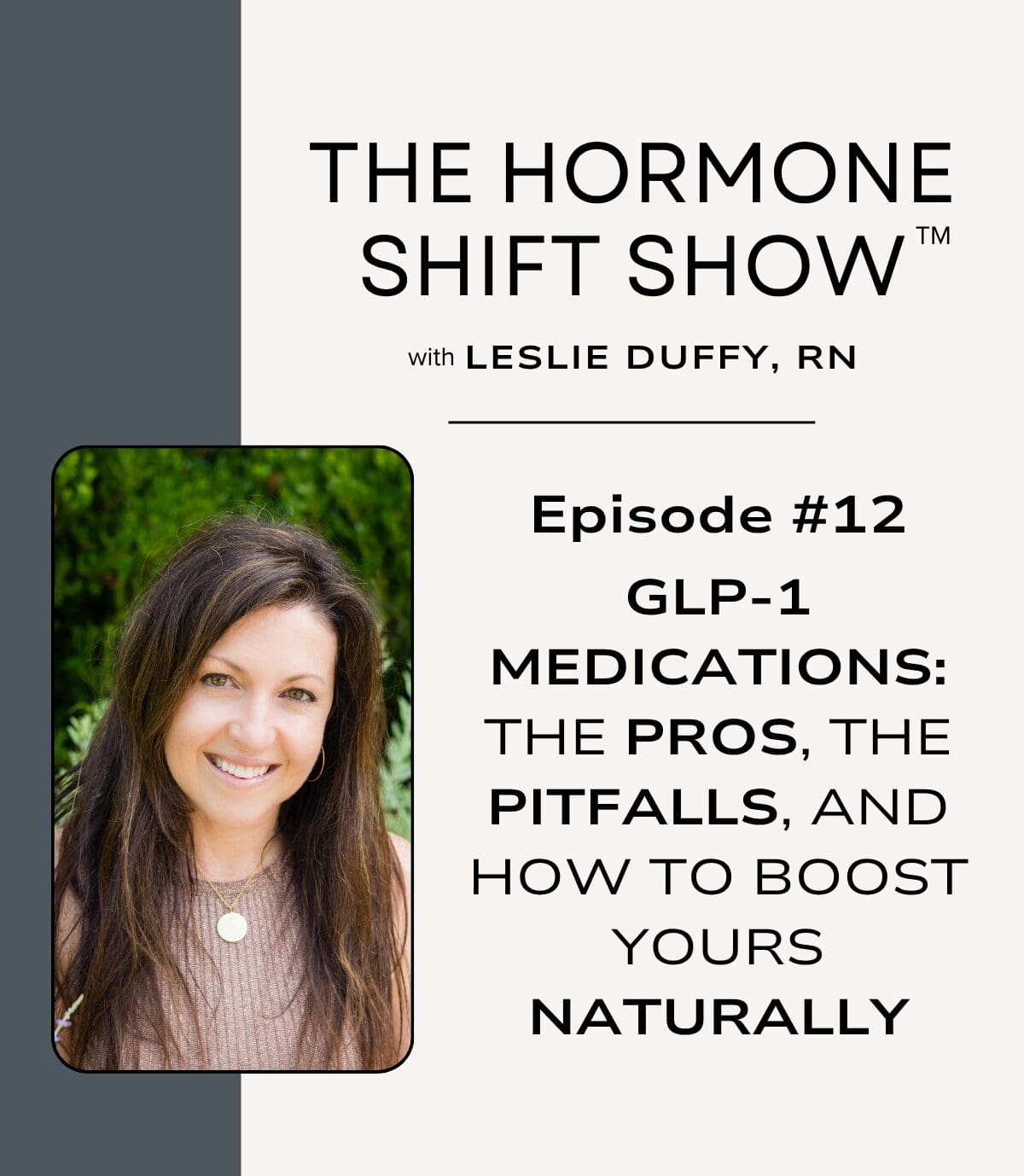“GLP-1s aren’t the villain, but they’re not a miracle either.” – Leslie Duffy
GLP-1s like Ozempic and Wegovy are everywhere right now and it’s easy to understand why. They promise freedom from food noise, easier weight loss, and more control. That’s especially attractive in midlife when your body feels so unpredictable. But like most quick fixes, it isn’t that simple. These medications can help but they can also leave your metabolism weaker if you don’t support your body the right way.
What most people don’t realize is that the body already makes its own GLP-1 hormone. It’s built to help you manage blood sugar, appetite, and metabolism naturally. The problem is, stress, lack of sleep, and poor gut health can throw that system completely off. So, before you add medication to the mix, it’s worth understanding how to work with your body instead of against it.
In this episode, I break down what GLP-1s really do, who they can help, and where they can go wrong. We’ll talk about what happens when you stop taking them, why muscle loss matters, and the five simple ways you can naturally boost your own GLP-1 levels through food, movement, and daily habits that actually feel good. By the end, you’ll have a clear picture of how these medications fit into the bigger conversation and how to take care of your metabolism whether you’re using them or not.
Your Takeaways
- What GLP-1 is, how it’s made in the gut, and why it’s key for blood sugar and appetite regulation
- Common signs of low GLP-1 such as cravings, energy crashes, and brain fog
- How gut health, stress, and nutrition impact natural GLP-1 production
- The benefits of GLP-1s for blood sugar, appetite, and inflammation
- The downsides of GLP-1s: muscle and bone loss, hormone disruption, and digestive changes
- Why GLP-1 medications must be paired with nutrition and lifestyle support
- The risks of rapid fat loss and why detox pathways need attention
- How functional medicine uses GLP-1s strategically while focusing on whole-body health
- Five natural ways to support GLP-1
- Why lasting results only come from strengthening your foundations
Mentioned in this Episode
Grab your Episode 12 Free Listener Guide: https://leslie-duffy-coaching.kit.com/efb12b4023
Articles:
- Adverse Effects of GLP-1 Receptor Agonists
- Clinical Recommendations to Manage Gastrointestinal Adverse Events in Patients Treated with Glp-1 Receptor Agonists: A Multidisciplinary Expert Consensus
- GLP-1 Agonists
- GLP-1 Receptor Agonists: What Are the Side Effects?
- GLP-1 Receptor Agonists: Beyond Their Pancreatic Effects
- Glucagon-Like Peptide-1 Receptor Agonists
- ‘Ozempic babies’ surprising women as weight loss drug found to lower efficacy of birth control pills
- ‘Unusual’ new side effect of drugs like Ozempic becoming ‘increasingly common
👇 Ready to take your next step with Leslie?
Start with a free 20-minute Info Call to explore which of Leslie’s health programs are right for you.
💡 Book your free Info Call here → https://l.bttr.to/QmMLF
Want to explore all of Leslie’s programs and resources?
Visit the Work With Me page to see the full list of options, from free consultations and wellness assessments to functional lab testing, coaching programs, and mini courses. It’s your one place to learn how Leslie can support your midlife health journey.
✨ Explore now → https://leslieduffycoaching.com/how-to-work-with-me
Let’s connect!
Find me on Linkedin: www.linkedin.com/in/leslie-duffy-rn
Facebook: https://www.facebook.com/LeslieDuffyCoaching/
Send me a message and follow me on Instagram @LeslieDuffyCoaching
Don’t forget to Subscribe to the YouTube Channel: https://www.youtube.com/@TheHormoneShiftShow
Check out Leslie’s favorite things: Amazon Storefront
Got feedback?
I love hearing from listeners! Email your questions or topic requests to Leslie@TheHormoneShiftShow.com
Disclaimer
The content in this podcast and on this website is not a substitute for medical advice from your health care practitioner or your medical team. While I am a licensed healthcare professional, I am not giving you medical advice. This is purely for educational purposes. Please consult your provider for medical guidance specific to you.
